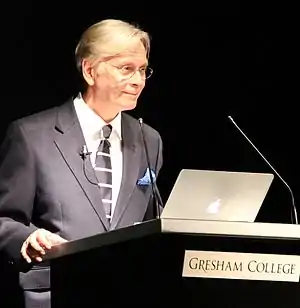Martin Elliott (surgeon)
Martin John Elliott (born 8 March 1951) is a British surgeon. He is presently Co-Medical Director at Great Ormond Street Hospital, Professor of Paediatric Cardiothoracic Surgery at University College London, Director of the National Service for Severe Tracheal Disease in Children and Gresham Professor of Physic at Gresham College. His team is one of the few around the world which specialise in slide tracheoplasty operations.[1]
Martin Elliott | |
|---|---|
 Martin Elliott delivering a Gresham College lecture. | |
| Born | 8 March 1951 Sheffield, England |
| Nationality | British |
| Scientific career | |
| Fields | Medicine Paediatric Care Heart Tracheal Disease Slide Tracheoplasty Operations |
| Institutions | Great Ormond Street Hospital University College London Gresham College |
Early life
Elliott was born on 8 March 1951 in Sheffield, England.[2] He trained at Newcastle University where he lectured in Anatomy between 1974 and 1975. He then joined the Medical School Surgical Programme at Southampton University in 1975 before gaining surgical, and then, cardiothoracic residency at Newcastle University until 1983.[3]
Career
Elliott was appointed a consultant paediatric cardiothoracic surgeon at Great Ormond Street Hospital in 1985 and has held the post of Professor of Cardiothoracic Surgery at University College London since 2004. Elliott was appointed Co-Medical Director of Great Ormond Street Hospital on 11 June 2010, replacing Robert Evans.[4]
Elliott has partaken in groundbreaking research in many different fields of medicine including the pathophysiology of cardiopulmonary bypass and the development and application of outcome registries in surgery for congenital heart disease (CHD). He developed the European Congenital Heart Defects Database, which was the forerunner of the EACTS and STS registries. He was also founding president of the International Nomenclature Society for CHD.[1]
Elliott has consulted and worked with Formula 1 teams and the airline and hotel industries to improve teamwork within cardiac care.
His most recent research project led to the first stem-cell-supported tracheal transplant in a child and to the expansion of research in tracheal tissue engineering.[5] However, the operation was not a success and the patient died two weeks later after the transplanted trachea collapsed.[6]
In 2014 Elliott was appointed Gresham Professor of Physic at Gresham College. In this four-century old Professorship he delivers series of free public lectures on The Heart of the Matter, "to explore [...] the challenging medical, ethical, financial and political issues of our time."[7]
Other Research Work
Elliott has had over 260 peer-reviewed articles published and has delivered over 300 invited lectures worldwide. He has partaken in many television documentaries and reviews scientific journals and teaches and operates throughout the world. Elliott has trained many of the world's leading paediatric cardiac surgeons and has been involved in service reform in several countries.[1]
At Great Ormond Street Hospital, Elliott leads on quality and safety and focuses on improving the experience for patients and providing information to their families so they can make informed choices when necessary. His work on quality and safety has won several prizes for Great Ormond Street Hospital. He has provided evidence to the Bristol Inquiry, about the Bristol heart scandal in the 1990s,[8] and the Francis Inquiry related to the importance of information provision for quality improvement.[9]
Personal life
Elliott is married to a former hospital and research manager. They had a son, Toby, who died in 2010 due to Epilepsy.[10]
Elliott enjoys listening to music in his spare time and is known to have Mozart or Miles Davis playing when in the operating theatre. He got involved with Formula 1 by noticing similarities between teams dealing with pitstops and the transfer of patients from theatre to intensive care.[11]
References
- "Tracheal - Martin Elliott - Meet the team - Clinical specialties - Great Ormond Street Hospital (accessed 4 June 2014)". Archived from the original on 6 November 2013. Retrieved 9 June 2014.
- "ELLIOTT, Prof. Martin John". Who's Who 2016. Oxford University Press. November 2015. Retrieved 8 November 2016.
- Martin Elliot The Cardiothoracic Surgery Network (accessed 4 June 2014)
- Trust announces new Co-Medical Director (accessed 4 June 2014)
- Appointment announcement on the Gresham College website, 12 June 2014
- BBC News Bristol Inquiry (accessed 4 June 2014)
- Mid Staffordshire NHS Foundation Trust Public Inquiry (accessed 4 June 2014)
- 'Top children's heart surgeon reveals anguish of his son's death to raise awareness of epilepsy' - Evening Standard 17 January 2017 (accessed 29 January 2017)
- 'A working life: The heart surgeon' - The Guardian 12 March 2011 (accessed 4 June 2014)